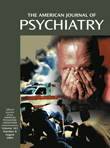Mortality and Poststroke Depression
To the Editor: In their innovative study on mortality and poststroke depression, Ricardo E. Jorge, M.D., et al. (1) found a significantly increased 9-year survival rate in stroke patients treated for 12 weeks with either fluoxetine or nortriptyline versus placebo, regardless of baseline level of depression, severity of stroke, concomitant medical illness, and impairment in cognitive and social functioning. The authors note that this remarkable extension of survival needs explanation.
One possibility might be the significant increase in levels of brain-derived neurotrophic factor found with long-term administration of antidepressants (2). Multiple investigators (see reference 3 for a review) have found that 1) levels of brain-derived neurotrophic factor are decreased in depression, 2) long-term use of antidepressants can prevent stress-induced reduction of brain-derived neurotrophic factor, and 3) stress can lead to atrophy and death of neurons, especially in the hippocampus (4). Indeed, antidepressant-induced neurogenesis in the hippocampus appears to be central to the behavioral effects of antidepressants (5). However, it is clear that brain-derived neurotrophic factor promotes neuronal survival, growth, and plasticity in the adult brain, whether or not depression is present.
Since stress and the accompanying increase in glucocorticoids seems to make neurons more vulnerable to ischemic insults (see reference 6 for an excellent review), the protective effect of increased levels of brain-derived neurotrophic factor in the brains of stroke subjects would be invaluable. It would have been interesting had the present authors measured baseline and subsequent levels of brain-derived neurotrophic factor in these patients since it seems plausible that survivors would have developed a significant and sustained increase in brain-derived neurotrophic factor compared with those who died.
Although the present study is intriguing, one hesitates to endorse the suggestion that all survivors of acute stroke be given antidepressants, especially in view of their association with falls and hip fractures (7) as well as bleeding with selective serotonin reuptake inhibitors (SSRIs) (8).
1. Jorge RE, Robinson RG, Arndt S, Starkstein S: Mortality and poststroke depression: a placebo-controlled trial of antidepressants. Am J Psychiatry 2003; 160:1823–1829Link, Google Scholar
2. Nibuya M, Morinobu S, Duman RS: Regulation of BDNF and trkB mRNA in rat brain by chronic electroconvulsive seizure and antidepressant drug treatments. J Neurosci 1995; 15:7539–7547Crossref, Medline, Google Scholar
3. Duman RS, Heninger GR, Nestler EJ: A molecular and cellular theory of depression. Arch Gen Psychiatry 1997; 54:597–606Crossref, Medline, Google Scholar
4. Sapolsky RM: Glucocorticoids and hippocampal atrophy in neuropsychiatric disorders. Arch Gen Psychiatry 2000; 57:925–935Crossref, Medline, Google Scholar
5. Santarelli L, Saxe M, Gross C, Surget A, Battaglia F, Dulawa S, Weisstaub N, Lee J, Duman R, Arancio O, Belzung C, Hen R: Requirement of hippocampal neurogenesis for the behavioral effects of antidepressants. Science 2003; 301:805–809Crossref, Medline, Google Scholar
6. Manji HK, Drevets WC, Charney DS: The cellular neurobiology of depression. Nat Med 2001; 7:541–547Crossref, Medline, Google Scholar
7. Liu B, Anderson G, Mittman N, To T, Axcell T, Shear N: Use of selective serotonin reuptake inhibitors or tricyclic antidepressants and risk of hip fractures in elderly people. Lancet 1998; 351:1303–1307Crossref, Medline, Google Scholar
8. deAbajo FJ, Rodriguez LA, Montero D: Association between selective serotonin reuptake inhibitors and upper gastrointestinal bleeding: population based case control study. BMJ 1999; 319:1106–1109Crossref, Medline, Google Scholar



